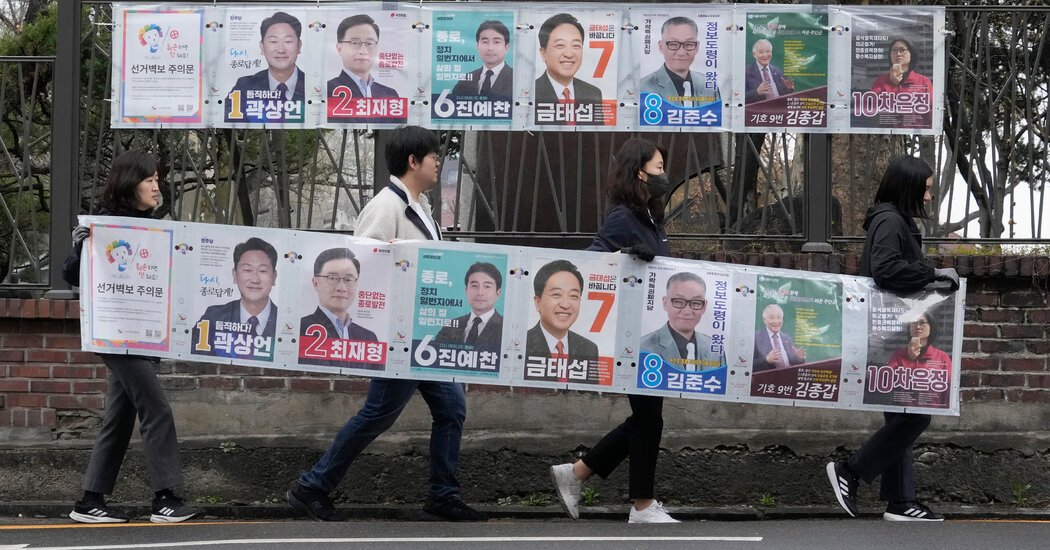In the two years since he was elected, President Yoon Suk Yeol has made his mark in foreign policy, forging deeper ties with the United States and Japan. But his business-friendly domestic agenda has been stalled by his own missteps and an opposition-controlled Parliament.
Mr. Yoon has a shot at a do-over on Wednesday, when South Koreans head to the polls to select a new Parliament.
Dozens of parties are vying for the 300 seats in the National Assembly, South Korea’s single-chamber legislature. However, the contest is largely between Mr. Yoon’s conservative People Power Party and the main opposition camp, the liberal Democratic Party. Both have intense followings, but the eventual winner is expected to be decided by moderate and swing voters.
This is the first general election since Mr. Yoon won the presidency in 2022, beating Lee Jae-myung of the Democratic Party by a razor-thin margin. The results will decide the makeup of the Assembly for the next four years, and they could also determine the political fate of the two rival leaders.
If his party suffers a major loss, Mr. Yoon, 63, could essentially become a lame duck for the rest of his single, five-year term and could even face the threat of impeachment. Mr. Lee, 59, who has faced bribery and other criminal charges in court, is equally desperate to score an electoral victory.
Under South Korea’s election law, results from public opinion surveys taken in the past week cannot be made public. But on the eve of the election, the opposition party sounded more upbeat about its chances of winning a majority of seats than Mr. Yoon’s did.
For the past two weeks, candidates have greeted voters at subway stations, woven through their districts on trucks mounted with loudspeakers, and even knelt and bowed before voters, as is customary here. All that canvassing stopped as voters began filing into balloting stations across the country at 6 a.m. on Wednesday, which is a national holiday because of the election.
The outcome of the contest is unlikely to have any immediate impact on Mr. Yoon’s efforts to expand security cooperation with Washington and Tokyo to deter North Korea, as foreign policy is concentrated in the hands of the president. But Mr. Yoon, who has been bogged down by controversies at home, can revive his long-stalled domestic agenda — corporate tax cuts and other business-friendly measures as well as his efforts to drastically increase the number of doctors — if his party wins big.
A large victory for the Democratic Party would elevate the status of Mr. Lee, who hopes to run for president again in 2027. His party has billed this election as an opportunity for South Koreans to punish Mr. Yoon over everything from rising consumer prices to allegations of corruption and abuse of power involving his family and the government.
Political polarization runs so deep in South Korea that many voters either want Mr. Yoon impeached or Mr. Lee imprisoned.
“We must serve a warning that if the worker is not faithful enough, he can be driven out of his job,” Mr. Lee said this week, a comment that South Korean news media said hinted at the possibility of impeaching Mr. Yoon if the opposition wins enough seats.
A dark horse in the election is Cho Kuk — the justice minister for Mr. Yoon’s liberal predecessor, Moon Jae-in — and his month-old Rebuilding Korea Party, which is closely allied with the Democratic Party. Mr. Cho has galvanized anti-Yoon voters with calls to turn the incumbent into a “lame” or “dead duck.”
“Three years are too long!” is his party’s main campaign slogan, which refers to Mr. Yoon’s remaining time in office.
Mr. Lee’s and Mr. Cho’s rivalry with Mr. Yoon is not only political but personal.
Under Mr. Yoon, the two opposition leaders and members of their families have been scrutinized by prosecutors and now face various criminal charges. The opposition for its part has passed bills that mandate investigations into allegations of corruption involving Mr. Yoon’s family and former prosecutors and judges. The president has vetoed those bills.
Each side, analysts said, has focused on demonizing the other instead of offering policy proposals. Mr. Yoon’s party has called Mr. Lee, Mr. Cho and their parties “criminals.” The opposition warned that South Korea under Mr. Yoon was turning into a “dictatorship,” accusing him of using prosecutors and state regulators to suppress unfriendly journalists and politicians; at times, Mr. Yoon’s bodyguards have even gagged and carried away citizens who shouted criticism at him.
“I have never seen an election like this: No campaign promise or policy has become an election issue, except for the forces from the opposite poles clashing to win at all costs,” said Heo Jinjae, an analyst at Gallup Korea.
More than 31 percent of the country’s 44 million eligible voters have already cast their ballots in early voting on Friday and Saturday. Polling experts say that the election will be decided largely by two overlapping blocs of swing voters: people in their 20s and 30s, and the roughly 20 percent of eligible voters who hold the middle ground between progressives and conservatives. Many voters in their 40s and 50s are progressives, while people in their 60s and older tend to vote conservative.
The rival parties competed for swing voters by playing up their enemies’ gaffes and past remarks.
Mr. Yoon committed one such gaffe when he visited a grocery store last month and made a comment that left South Koreans wondering whether he knew how much green onions, a staple, cost amid inflation. Since then, opposition candidates have brandished green onions at campaign rallies as a symbol of Mr. Yoon’s supposed disconnect from everyday life.
Pre-election surveys showed that a majority of voters in their 20s and 30s and those who called themselves moderates disapproved of Mr. Yoon’s performance.
“If anything, this election serves as a report card on Yoon Suk Yeol’s two years in office,” said Jaung Hoon, a political science professor at Chung-Ang University in Seoul.




